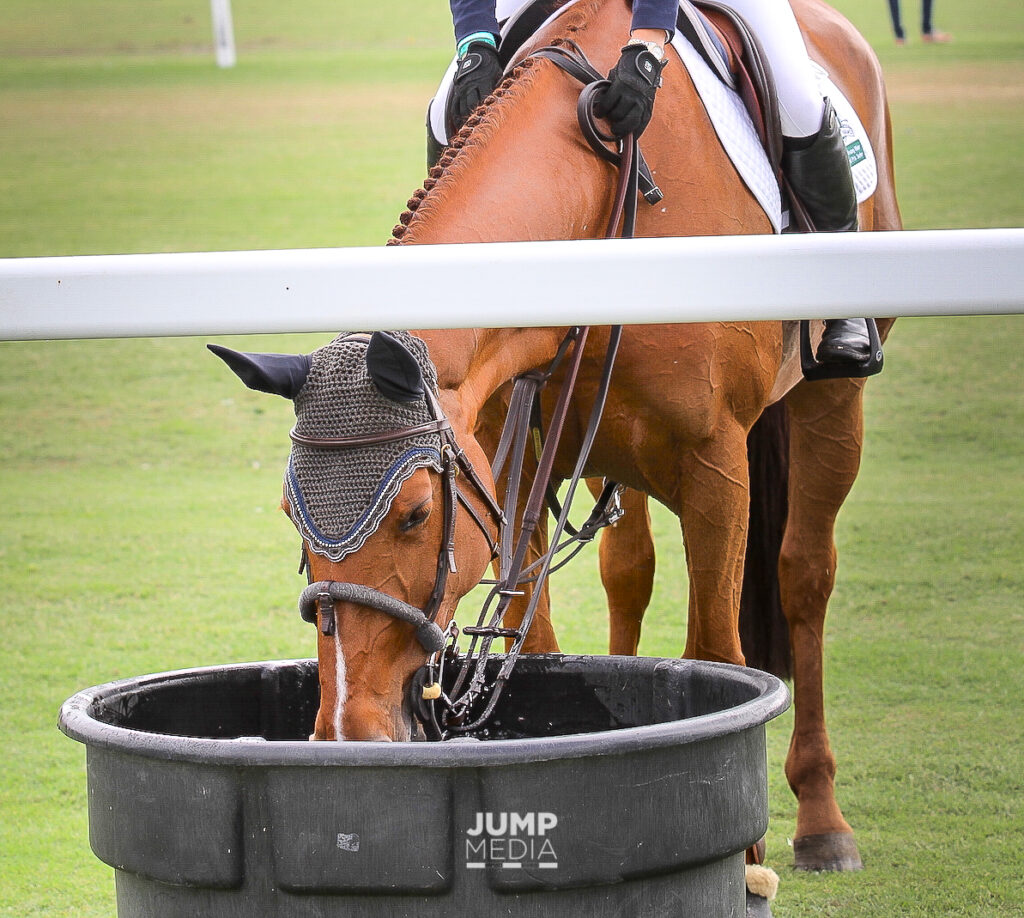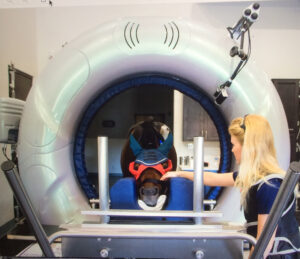Month: December 2019
5 Questions for Dr. Jordan Lewis

Dr. Jordan Lewis is a graduate of the University of Florida College of Veterinary Medicine and has dedicated her professional career to serving her home state. Dr. Lewis grew up with horses and completed an internship in equine medicine and surgery at the Equine Medical Center in Ocala.
Get to know Dr. Lewis:
1. What is your background with horses?
I moved from New York City to Fort Lauderdale, FL, when I was eight years old. My dad grew up loving horses, and when I was two, he bought a horse. We would travel from our home in New York City to visit him in the Pocono Mountains every weekend to ride. My first experience on a horse was riding double with my dad through cornfields. When I was eight years old, we moved to Florida and I was lucky enough to get my own pony. I got totally hooked on horses and I competed on the Arabian circuit as a teenager.
2. What inspired you to pursue veterinary medicine?
As a child, I participated in local 4-H programs and had the experience of touring an equine surgical and rehabilitation facility. I realized early that this was exactly what I wanted to do as my career.
3. When did you join Palm Beach Equine Clinic and what is your specialty?
I joined the team at Palm Beach Equine Clinic in June of 2005. I love the fact that we have such a dynamic team of veterinarians to work with and consult on difficult cases. I wouldn’t say I have a main focus as I am able to do everything from sports medicine and lameness exams to reproduction work thanks to the clinic’s wide range of cases and capabilities.

4. What advice would you give someone who wants to become an equine vet?
I would tell them that a career in large animal veterinary care is not just a job, it is a lifestyle. If it is what you are meant to do, you will love every minute of this lifestyle. I get to be outside and around horses all day. For me, this is the greatest profession.
5. What is one of the most interesting cases you have worked on?
The most interesting case I have worked on was a pericardial effusion. The condition is caused by excess fluid between the heart and the sac surrounding the heart, known as the pericardium. To remove the fluid, I performed a pericardiocentesis, which involved placing a drain within the sac around the heart to drain the excess fluid and relieve pressure on the heart. That is not something you get to do every day!
Horse Health Reminder: Hydration
Even in the winter months, it is important not to underestimate the heat, humidity, and sun. Palm Beach Equine Clinic stresses the importance of proper hydration and sun protection year-round, especially to Florida-based equestrians and winter season snowbirds.
There are many problems that can arise when temperatures climb, including overheating, dehydration, and colic. When the weather becomes chilly in Florida, horses often quit drinking as much water. This can lead to additional problems such as impaction. Your horse’s hydration is critically important for health and performance
Remember these 5 easy ways to protect your horse from sun and dehydration:

1. During extended periods of turnout, and when competing, horses should always have access to shaded areas. Scheduled rides and extended turnout should take place when the temperatures are lower, usually early mornings or in the evening on hot days, so the horse is not in direct sunlight.
2. The average horse drinks between five and 10 gallons of water per day. Therefore, easy and frequent access to clean, fresh water is a necessity. Pay special attention to increased intake during particularly hot days and plan accordingly.
3. Sodium in a horse’s diet is crucial for maintaining proper hydration. Providing a salt block or supplementing with properly measured electrolytes in a horse’s feed or water can help ensure that sodium requirements are being met and that your horse is drinking a sufficient amount of water.

4. Especially in the extreme summer heat, horse owners should pay attention to the amount of sweat their horse is producing. Anhidrosis, or the inability to sweat normally, can be a common challenge, particularly in hot, humid climates. In addition to lack of sweat, signs of anhidrosis can include increased respiratory rate, elevated temperature, areas of hair loss, or dry and flaky skin. If you notice any of these signs, contact Palm Beach Equine Clinic immediately.
5. Clean water buckets often and always fill with fresh water before leaving the barn. Veterinarians often recommend placing one bucket of fresh water and one bucket of electrolytes. Usually, a horse will balance his electrolytes with the opportunity to drink from one or more of these buckets.
These are just a few of the important issues to be aware of during the temperature change in Florida. Contact Palm Beach Equine Clinic to learn more about precautions that can be taken to keep horses happy and healthy throughout the winter competition season.
Typically, when a horse’s gait feels off or may be lacking usual impulsion, the rider often assumes it to be an issue of lameness associated with the forelimbs or hindlimbs. However, that may not always be the case. Utilizing advanced diagnostic imaging techniques, Palm Beach Equine Clinic is able to accurately pinpoint the specific area that is affecting overall performance. In many cases, the cervical vertebrae are often identified as the cause of lameness, asymmetry, and poor performance.
Vertebral Anatomy

The neck is composed of seven articulating cervical vertebrae running from the head to the thorax, named C1 through C7. The neck allows movement of the head while protecting the spinal cord and providing an avenue for nerves to travel. Impingement on the spinal cord and nerves connected to the cervical vertebrae can exhibit neurologically as ataxia, neck pain, or lameness.
Signs of Lameness Related to the Neck
In a lameness exam, a veterinarian will perform flexion tests and palpate areas of the body looking for decreases in the horse’s range of motion or pain upon flexion. The rider may pick up on subtle lameness issues associated with the neck by feeling a change in the horse’s suppleness or resistance to yielding in a certain direction. Lameness may even present itself as a difference in the horse’s balance, such as being heavier on the forehand, or performance issues such as late lead changes. The tried-and-true “carrot test” can also show if a horse is resistant to flexing their neck.
Identifying Lameness through Diagnostic Imaging
Historically, neck issues related to performance are generally diagnosed through a process of ruling out other areas of the body. Diagnostic imaging can now be the most powerful and effective tool for identifying the cause of lameness related to cervical injury and hereditary malformation.

Computed Tomography (CT) scans have revolutionized the ability to assess the entire neck and can be performed while the horse is standing and under light sedation. Computed Tomography images can be rendered into three-dimensional models and sliced in any orientation, allowing the veterinarian to evaluate the vertebrae in great detail that is incomparable to standard radiographs (x-rays). These comprehensive CT scans offer veterinarians a thorough profile so they can accurately diagnose and initiate an effective response.
A standing CT scanner is the latest addition to Palm Beach Equine Clinic’s arsenal of diagnostic imaging modalities. Currently, Palm Beach Equine Clinic is the only equine hospital in South Florida offering this capability. Compared to other modalities such as MRI or Nuclear Scintigraphy, Computed Tomography offers a valuable return for its rapid acquisition of images. If you suspect there is an issue in your horse’s neck please, contact Becky at Palm Beach Equine Clinic at 561-793-1599 to schedule an appointment.
Equine Veterinary Care Available at PBIEC Showgrounds Annex Office
One of the world’s premier veterinary facilities, Palm Beach Equine Clinic, will return as the Official Veterinarians of the 2020 Winter Equestrian Festival (WEF) and Adequan® Global Dressage Festival (AGDF) running January 8 through March 29 at the Palm Beach International Equestrian Center (PBIEC) in Wellington, FL.
With the health and welfare of equine athletes a top priority for the upcoming winter show jumping and dressage competition seasons, Palm Beach Equine Clinic will continue more than three decades of service to both the year-round residents and visiting horses of south Florida. The clinic’s world-renowned facility is conveniently located at the intersection of Southfields Road and Pierson Road in the heart of Wellington, just minutes from PBIEC, the Equestrian Village, and the International Polo Club Palm Beach. Palm Beach Equine Clinic comprises over 35 veterinarians, with board-certified surgeons and internists, and robust support by knowledgeable technicians and staff. Palm Beach Equine Clinic offers exceptional veterinary care and an innovative approach to help each horse achieve their full potential in and outside of the show ring.

In addition to at the full-service equine hospital, Palm Beach Equine Clinic veterinarians will be available each week to all competing horses at WEF and AGDF thanks to an annex office located adjacent to the WEF stabling office on the PBIEC showgrounds. Palm Beach Equine Clinic veterinarians are on call daily at the annex office to assist competitors throughout the shows with diagnostic evaluations and treatments, as well as emergency and standard horse care needs. Equestrians are always welcome at the annex, where they have the opportunity to discuss their horse health needs with Palm Beach Equine Clinic.

“Combining the unique offerings of our imaging department, renowned surgical talent, diverse veterinary expertise, and overall high standard of treatment allows us to provide services and care that are akin to the Mayo Clinic for human patients,” said Palm Beach Equine Clinic President Dr. Scott Swerdlin. “The Winter Equestrian Festival and [Adequan®] Global Dressage Festival attract some of the world’s top horses to south Florida. Whether we are treating Olympic level athletes or a trusted companion pony, they will receive the most advanced, dedicated healthcare. It takes a team to achieve success in the competitive arena, and we provide one of the best in the world at Palm Beach Equine Clinic.”
Palm Beach Equine Clinic veterinary advances – available to new, returning, and referred clients – include:
Advanced Diagnostic Offerings
- Computed Tomography (CT) Machine
- Standing Magnetic Resonance Imaging (MRI)
- Nuclear Scintigraphy (bone scan)
- Board-Certified Radiologist on Staff
- Digital Radiography and Ultrasonography
Surgical Offerings
- Three boarded surgeons skilled in performance-related injuries
- Standing surgery pit
- Surgical residency program
- Advanced surgical suite
Specialty Offerings
- Internal medicine specialists
- Quarantine facilities with secure isolation and individual airflow systems
- Alternative medicine specialists focused on chiropractic, acupuncture, and Chinese herbals
- Renowned sports medicine specialists
- On-site hospital with 24-hour staff
- Dentistry, ophthalmology, and farriery expertise

In addition to being the Official Veterinarians of WEF and AGDF, Palm Beach Equine Clinic will again participate in WEF’s popular Lunch & Learn education series during the 2020 season. Mark your calendars for a presentation entitled “Modern Medicine for the Competitive Sport Horse: How to Gain and Maintain a Healthy and Sound Show Horse” on Thursday, March 12, at 11:30 a.m. in The Wellington Club at the WEF showgrounds. Admission to the Lunch & Learn series is free for riders, trainers, and owners and includes the opportunity to learn how to help the competitive sport horse achieve and maintain optimal health through advanced technology, innovative approaches, and specialty therapies; a buffet lunch; and a chance to win exciting prizes.
For more information on what Palm Beach Equine Clinic has to offer horses competing at WEF and AGDF, stop by the annex office located next to the stabling office on the WEF showgrounds, visit www.EquineClinic.com, or call 561-793-1599.